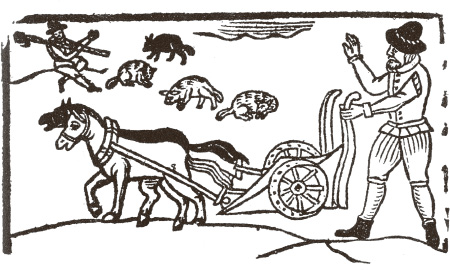
VI
I Can Guide a Plough …
Rural Life and Occupations
I Can Guide a Plough …
Rural Life and Occupations
The pastoral song is fairly frequent, especially in the southern counties of England. Its chief theme is the joys of country life. Such are the songs in which the ploughman is the chief personage, and one who glories in his calling … Then there are the sheep-shearing songs … Harvest home songs too are not lacking.
Frank Kidson and Mary Neal, English Folk-Song and Dance (1915), pp. 60–61
It is not surprising that country life and rural affairs feature so strongly in the folk-song repertoire. Not only did many of the songs originate in a time when the majority of the population lived in the countryside (i.e. before 1850), but the Victorian and Edwardian enthusiasts worked mainly in rural areas, and indeed they often used ‘country song’ as a synonym for ‘folk song’. But many of the songs actually originated in towns, written either for the predominately urban broadside trade or as pastoral ditties for pleasure gardens and other commercial entertainment venues, and the view of country life portrayed in folk song is not, on the whole, a realistic one.
Sociologists dubbed the twentieth-century farm employee ‘the deferential worker’, and earlier generations (notwithstanding occasional outbursts such as the ‘Captain Swing’ riots in the 1830s) appear to have been similarly unprotesting. There are exceptions, but the most well-known folk songs about farmwork (‘All Jolly Fellows Who Follow the Plough’, No. 91, and ‘The Farmer’s Boy’, No. 94) are not critical or complaining. In England, there is little evidence of the ‘bothy ballad’ type of song which occurs frequently in Scottish tradition – songs that feature scathing comments on working conditions in general and even on specific farms and farmers. Pride in skilled work and contentment with one’s lot is the more usual tone in England. It is perhaps curious that even parodies of the rural worker like ‘Buttercup Joe’ (No. 93) were adopted so enthusiastically by country folk, but they certainly were.
Harvest homes and other rural gatherings tied to the rhythms of the agricultural year were also noted as places where singing was expected and encouraged, and a high proportion of the songs performed in these contexts championed and celebrated rural life.
There is nothing particularly rural about drinking songs, of which there are many, although they may have had a particular resonance if sung in places where the barley or the hops were actually grown.
91
All Jolly Fellows Who Follow the Plough
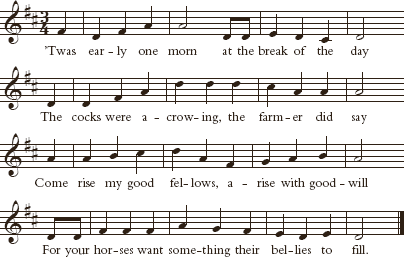
’Twas early one morn at the break of the day
The cocks were a-crowing, the farmer did say
Come rise my good fellows, arise with goodwill
For your horses want something their bellies to fill.
When four o’clock comes then up we do rise
And into the stable, boys, merrily flies
With a-rubbing and a-scrubbing our horses I’ll vow
We’re all jolly fellows who follow the plough.
When five o’clock comes at breakfast we meet
With beef, pork and bread, boys, so merrily eat
With a piece in our pockets I’ll swear and I’ll vow
We’re all jolly fellows who follow the plough.
When six o’clock comes then out we do go
To see which of us a straight furrow could hold
In all kinds of weather I’ll swear and I’ll vow
We’re all jolly fellows who follow the plough.
Our master came to us and this he did say
‘What have you been doing, boys, all this long day?
You haven’t ploughed an acre, I’ll swear and I’ll vow
You’re all idle fellows who follow the plough.’
I turned myself round and made this reply
‘Yes we have ploughed an acre, you’re telling a lie
We have ploughed an acre, I’ll swear and I’ll vow
We’re all jolly fellows who follow the plough.’
Our master turned round and laughed at the joke
‘It’s half past two o’clock, boys, it’s time to unyoke
Unharness your horses and scrub them down well
And I’ll give you a jug of the very best ale.’
So come all ye plough lads, where’er you may be
Never fear your master, take this advice from me
No, never fear your master, I’ll swear and I’ll vow
We’re all jolly fellows who follow the plough.
92
The Barley Mow
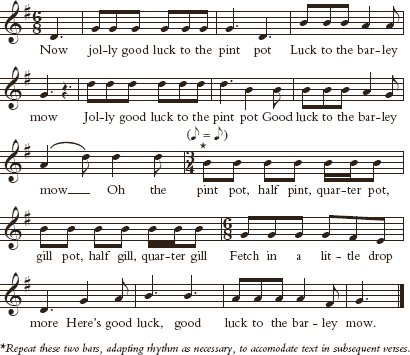
Now jolly good luck to the pint pot
Luck to the barley mow
Jolly good luck to the pint pot
Good luck to the barley mow
Oh the pint pot, half pint, gill pot, half gill, quarter gill
Fetch in a little drop more
Here’s good luck, good luck to the barley mow.
Now jolly good luck to the quart pot
Luck to the barley mow
Jolly good luck to the quart pot
Good luck to the barley mow
Oh the quart pot, pint pot, half pint, gill pot, half gill, quarter gill
Fetch in a little drop more
Here’s good luck, good luck, to the barley mow.
Now jolly good luck to the half a gallon
Luck to the barley mow
Jolly good luck to the half a gallon
Good luck to the barley mow
Oh the half a gallon, quart pot, pint pot, half pint, gill pot, half gill, quarter gill
Fetch in a little drop more
Here’s good luck, good luck, to the barley mow.
… the gallon
… the half a bushel
… the bushel
… the half a barrel
… the barrel
… the barmaid
… the landlady
… the landlord
… the brewery
… all this company
93
Buttercup Joe
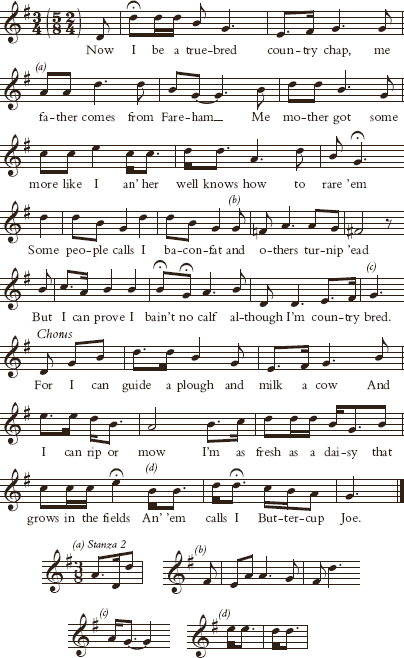
Now I be a true-bred country chap, me father comes from Fareham
Me mother got some more like I an’ her well knows how to rare [rear] ’em
Some people calls I bacon-fat and others turnip ’ead
But I can prove I bain’t no calf although I’m country bred.
Chorus
For I can guide a plough and milk a cow
And I can rip or mow
I’m as fresh as a daisy that grows in the fields
An’ ’em calls I Buttercup Joe.
Now have you seen my young ’ooman, ’em calls her our Mary
Her works as busy as a bumblebee down in Sir Johns’s dairy
And don’t her make some dumplings nice, by joves I means to try ’em
An’ ax her how her’d like to wed a country chap like I am.
Some folk they do like haymaking, there’s others they likes mowin’
But of all the jobs that I loves best, then give I turnip hoein’
And don’t I hopes when I gets wed to my old Mary Ann
I’ll work for her and try me best, to please her all I can.
94
The Farmer’s Boy
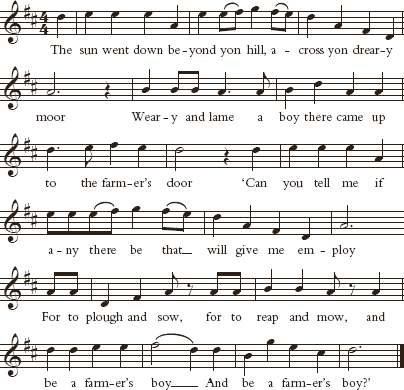
The sun went down beyond yon hill, across yon dreary moor
Weary and lame a boy there came up to the farmer’s door
‘Can you tell me if any there be that will give me employ
For to plough and sow, for to reap and mow, and be a farmer’s boy
And be a farmer’s boy?’
‘My father’s dead and my mother’s left with her five children small
And what is worse for my mother still, I’m the oldest of them all
Though little I am I fear no work, if you’ll give me employ
For to plough and sow, for to reap and mow, and be a farmer’s boy
And be a farmer’s boy.’
‘And if that you won’t me employ, one favour I’ve to ask
Will you shelter me till the break of day from this cold winter’s blast?
At the break of day I’ll trudge away, elsewhere to seek employ
For to plough and sow, for to reap and mow, and be a farmer’s boy
And be a farmer’s boy.’
The farmer said, ‘I’ll try the lad, no further let him seek.’
‘Oh yes, dear father,’ the daughter said, while tears ran down her cheek
‘For them that will work it’s hard to want and wander for employ
For to plough and sow, for to reap and mow, and be a farmer’s boy
And be a farmer’s boy.’
At length the boy became a man, the good old farmer died
He left the lad the farm he had and his daughter to be his bride
And now that lad a farmer is, and he smiles and thinks with joy
Of the lucky, lucky day he came that way, to be a farmer’s boy
To be a farmer’s boy.
95
Fathom the Bowl
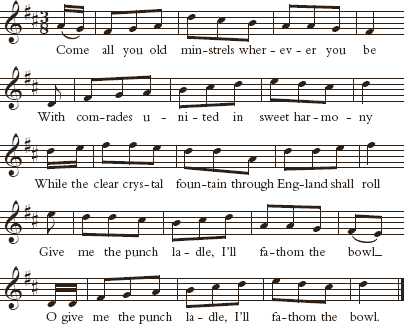
Come all you old minstrels wherever you be
With comrades united in sweet harmony
While the clear crystal fountain through England shall roll
Give me the punch ladle, I’ll fathom the bowl
O give me the punch ladle, I’ll fathom the bowl.
Let nothing but harmony reign in our breast
Let comrade with comrade be ever at rest
[Let’s lift up our glasses, good cheer is our goal]
Give me the punch ladle, I’ll fathom the bowl
O give me the punch ladle, I’ll fathom the bowl.
From France cometh brandy, Jamaica gives rum
Sweet oranges, lemons from Portugal come
Of beer and good cider we’ll also take toll
Give me the punch ladle, I’ll fathom the bowl
O give me the punch ladle, I’ll fathom the bowl.
Our brothers lie drowned in the depths of the sea
Cold stones for their pillows, what matters to we?
We’ll drink to their healths and repose to each soul
Give me the punch ladle, I’ll fathom the bowl
O give me the punch ladle, I’ll fathom the bowl.
Our wives they may bluster as much as they please
Let ’em scold, let ’em grumble, we’ll sit at our ease
[They may scold and grumble till they’re black as the coal]
Give me the punch ladle, I’ll fathom the bowl
O give me the punch ladle, I’ll fathom the bowl.
96
Green Brooms
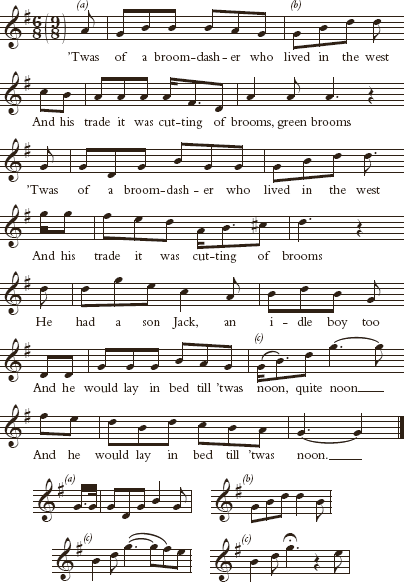
’Twas of a broomdasher who lived in the west
And his trade it was cutting of brooms, green brooms
’Twas of a broomdasher who lived in the west
And his trade it was cutting of brooms
He had a son Jack, an idle boy too
And he would lay in bed till ’twas noon, quite noon
And he would lay in bed till ’twas noon.
So the old man he rose and downstairs he goes
And he swore he would fire Jack’s room, room room
The old man he rose and downstairs he goes
And he swore he would fire Jack’s room
If he didn’t arise and sharp up his knives
And go to the wood and cut brooms, green brooms
And go to the wood and cut brooms.
So Jack he arose and he put on his clothes
And he went to the wood to cut brooms, green brooms
So Jack he arose and put on his clothes
And he went to the wood to cut brooms
He vowed and he swore he’d do it no more
That he’d go to the wood to cut brooms, green brooms
He’d go to the wood and cut brooms.
So Jack trudg-ed on to where he’s not known
Till he came to a castle of fame, fame fame
So Jack trudg-ed on to where he’s not known
Till he came to a castle of fame
And there he did bawl as loud as could call
‘Kind lady, do you want any brooms, green brooms?
Kind lady, do you want any brooms?’
The lady was there, and hearing Jack bawl
Said, ‘Call the young man with his brooms, brooms brooms.’
The lady was there, and hearing Jack bawl
Said, ‘Call the young man with his brooms.’
So Jack trudg-ed on to where he’s not known
Till he came to the lady’s fair room, room room
Till he came to the lady’s fair room.
She said, ‘You young blade, why not leave off your trade
And marry a lady in bloom, full bloom.’
She said, ‘You young blade, why not leave off your trade
And marry a lady in bloom.’
So Jack gave his consent and to the church went
And he married the lady in bloom, full bloom
And he’s married that lady in full bloom.
97
John Barleycorn
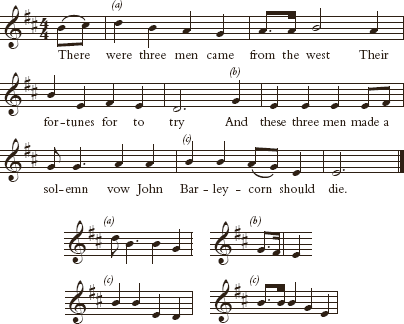
There were three men came from the west
Their fortunes for to try
And these three men made a solemn vow
John Barleycorn should die.
So they ploughed and sowed and harrowed him in
Throwed clats upon his head
And these three men made a solemn vow
John Barleycorn was dead.
Then they let him lay for a long time
Till rain from heaven did fall
And little Sir John sprang up his head
And he amazed them all.
Then they let him stand for a long time
And he grew both pale and wan
And little Sir John grew with a long beard
And so he became a man.
They hired men with scythes so sharp
To cut him off at the knee
And the loader he served him worse than that
For he served him most barbarously.
Then they dragged him round and round the field
Till they came unto a barn
And there they made a solemn mow
Of poor John Barleycorn.
They hired men with crab-tree sticks
They cut him skin from bone
And the miller he served him worse than that
For he ground him between two stones.
Now here’s little Sir John in a nut-brown bowl
And brandy in a glass
And here’s little Sir John in a nut-brown bowl
He’ll slay the strongest man at last.
For the huntsman he can’t hunt the fox
Nor loudly blow his horn
Nor the tinker he can’t mend kettles or pots
Without little Lord Barleycorn.
98
The Jolly Waggoner

When first I went a-waggoning, a-waggoning did go
I broke my parents’ hearts with sorrow, grief and woe
For many were the hardships that we had to undergo
Singing whoa, my lads, drive on, my lads, drive on, my lads, drive on
For there’s none can drive a waggon when the horses will not go.
On a cold and frosty morning I was wet through to my skin
And there we had to wander till we reached to yonder inn
There we sat a-talking to the landlord and his wife
Singing whoa, my lads, drive on, my lads, drive on, my lads, drive on
For there’s none can drive a waggon when the horses will not go.
O the summertime is coming, what pleasures shall I see
The blackbird and the throstle sing in every greenwood tree
And every lass shall have a lad and sit her on his knee
Singing whoa, my lads, drive on, my lads, drive on, my lads, drive on
For there’s none can drive a waggon when the horses will not go.
99
The Lark in the Morning
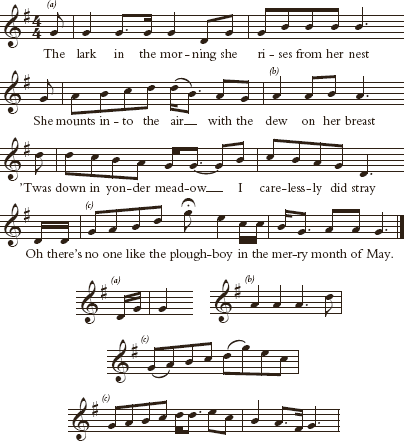
The lark in the morning she rises from her nest
She mounts into the air with the dew on her breast
’Twas down in yonder meadow I carelessly did stray
Oh there’s no one like the ploughboy in the merry month of May.
When his day’s work is over and then what will he do
He’ll fly into the country, his wake to go
And with his pretty sweetheart he’ll whistle and he’ll sing
And at night he’ll return to his own home again.
And when he returns from his wake unto the town
The meadows they are mowed and the grass it is cut down
The nightingale she whistles upon the hawthorn spray
And the moon is a-shining upon the new-mown hay.
So here’s luck to the ploughboys wherever they may be
They’ll take a winsome lass to sit on their knee
And with a jug of beer, boys, they’ll whistle and they’ll sing
For the ploughboy is as happy as a prince or a king.
100
The Miller’s Three Sons
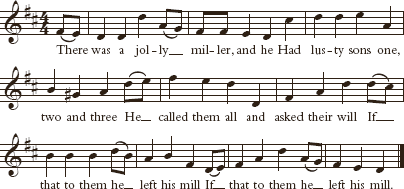
There was a jolly miller and he
Had lusty sons one, two and three
He called them all and asked their will
If that to them he left his mill
If that to them he left his mill.
He called first to his eldest son
Saying, ‘My life is almost run
If I to you this mill do make
What toll do you intend to take
What toll do you intend to take?’
‘Father,’ said he, ‘my name is Jack
Out of a bushel I’ll have a peck
From every bushel that I grind
That I may a good living find
That I may a good living find.’
‘Thou art a fool!’ the old man said
‘Thou has not well learned thy trade
This mill to thee I ne’er will give
For by such toll no man can live
For by such toll no man can live.’
He called for his middlemost son
Saying, ‘My life is almost run
If to you this mill I do make
What toll do you intend to take
What toll do you intend to take?’
‘Father,’ says he, ‘my name is Ralph
Out of a bushel I’ll take a half
From every bushel that I grind
That I may a good living find
That I may a good living find.’
‘Thou art a fool,’ the old man said
‘Thou has not well learned thy trade
The mill to you I ne’er will give
For by such toll no man can live
For by such toll no man can live.’
He called for his youngest son
Saying, ‘My life is almost run
If I to you this mill do make
What toll do you intend to take
What toll do you intend to take?’
‘Father,’ said he, ‘I’m your only boy
For taking toll is all my joy
Before I will a good living lack
I’ll take it all and forswear the sack
I’ll take it all and forswear the sack.’
‘Thou art the boy,’ the old man said
‘For thou hast right well learned thy trade
This mill to thee I give,’ he cried
And then turned up his toes and died
And then turned up his toes and died.
101
The Painful Plough
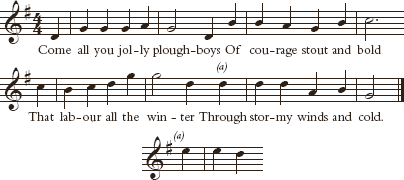
Come all you jolly ploughboys
Of courage stout and bold
That labour all the winter
Through stormy winds and cold.
‘Hold, ploughman,’ says the gardener
‘Count not your trade with ours
But walk you through the garden
And view the various flowers.’
‘Likewise those curious borders
And pleasant walks renew
There’s no such piece of pleasure
Performed by the plough.’
‘Hold, gardener,’ says the ploughman
‘No calling I despise
For each man for a living
Upon his trade relies.’
‘For Adam was a ploughman
When ploughing did begin
The next that did succeed him
Was Cain his eldest son.’
‘Some of the generations
The calling to pursue
That bread might not be wanted
For needing of the plough.’
‘For Samson was a strong man
And Solomon was wise
Alexander for the conquering
Was all that he did prize.’
‘King David he was valiant
And many a man he slew
But none of these bold heroes
Can live without the plough.’
‘Now all these wealthy merchants
Will plough the raging seas
That bring home foreign treasures
For those that live at ease.’
‘And fine silks from the Indies
With flour and spices too
They all are brought to England
By virtue of the plough.’
I hope none are offended
At me for singing this
It never was intended
For to be taken amiss.
If it were not for the ploughboys
Both rich and poor might rue
For we are all depending
Upon the painful plough.
102
Twankydillo

Here’s a health to the jolly blacksmith, the best of all fellows
The man at his anvil while the boy blows the bellows
For it makes our bright hammer to rise and to fall
There’s the old Cole and the young Cole and the old Cole of all
Twankydillo, Twankydillo, dillo, dillo, dillo, dillo, dillo
And a roaring pair of bagpipes made of a green willow.
Here’s a health to that pretty girl, the one I love best
For she carries the fire within her own breast
For it makes my bright hammer to rise and to fall
There’s the old Cole and the young Cole and the old Cole of all
Twankydillo, etc.
If a gentleman calls, his horse for to shoe
We make no deliance in one pot or two
For it makes our bright hammers to rise and to fall
There’s the old Cole and the young Cole and the old Cole of all
Twankydillo, etc.
Here’s a health to our queen, likewise all her men
And all the Royal Family that ever was seen
For it makes our bright hammers to rise and to fall
There’s the old Cole and the young Cole and the old Cole of all
Twankydillo, etc.